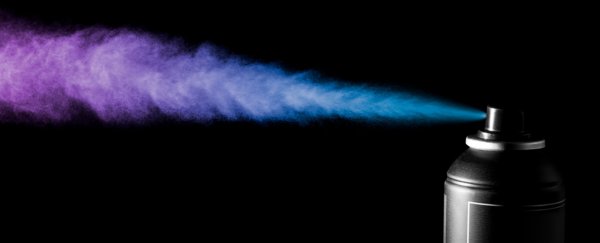Wearing antiperspirant or deodorant might be a good way to help manage your body odour, is this a good or a bad thing for the health of our skin? Right now, scientists have no idea.
Researchers in the US have found that using these personal hygiene products on your skin significantly affects the type and quantity of bacterial life in the armpit's microbiome. While there's no evidence that this is necessarily harmful to human health, the researchers say it's possible that these natural microbes serve a beneficial purpose, and if they do, it could mean we're doing ourselves no favours by altering them.
"Thousands of bacteria species have the potential to live on human skin, and in particular in the armpit," said ecologist Rob Dunn from North Carolina State University. "Just which of these species live in any particular armpit has been hard to predict until now, but we've discovered that one of the biggest determinants of the bacteria in your armpits is your use of deodorant and/or antiperspirant."
To assess the microbial impact of wearing deodorant and antiperspirant, the researchers studied 17 participants over the course of eight days.
The group consisted of three sub-groups: seven people who routinely used antiperspirant, which reduces the amount we sweat; five participants who routinely used deodorant, which often includes ethanol or other antimicrobials to kill odour-causing microbes; and five people who used neither. The participants had swabs taken of their armpits twice daily during the experiment.
At the beginning of the study, the participants followed their usual personal hygiene routine, but on days two through six, no deodorant or antiperspirant were used. On the two final days, all participants used antiperspirant.
"We found that, on the first day, people using antiperspirant had fewer microbes in their samples than people who didn't use product at all – but there was a lot of variability, making it hard to draw firm conclusions," said one of the researchers, Julie Horvath of North Carolina Central University. "In addition, people who used deodorant actually often had more microbes – on average – than those who didn't use product."
By day six, when all participants had not used the products for five days, the amount of bacteria in their armpits was fairly comparable, but when the entire group began using antiperspirant on the final two days, the researchers found dramatically reduced microbial growth.
This suggests that while antiperspirant use appears to decrease microbe populations, deodorant actually increases them.
Using genetic sequencing to analyse the composition and variety of bacteria in the participants' sweat when no product was used, the researchers found that antiperspirant in particular produces very different microbe populations in people's armpits.
Whereas those who didn't normally wear deodorant or antiperspirant exhibited high levels of Corynebacteria (62 percent of microbes found) and low levels of Staphylococcaceae (21 percent), this was almost reversed in antiperspirant users (with 14 percent and 60 percent respectively).
Corynebacteria, while partly responsible for body odour, are thought to help us defend against pathogens. Staphylococcaceae are a group of bacteria, most of which are considered beneficial, although some can pose a risk to human health in some circumstances.
But the fact that the products we use can so dramatically alter the composition of these bacteria in our armpit microbiome could potentially have significant consequences, the researchers report in PeerJ.
"Using antiperspirant and deodorant completely rearranges the microbial ecosystem of your skin – what's living on us and in what amounts," said Horvath. "And we have no idea what effect, if any, that has on our skin and on our health. Is it beneficial? Is it detrimental? We really don't know at this point."
Previous research by some of the same scientists recently compared armpit microbes between humans and non-human primates, and found that the microbes have evolved over time in conjunction with the species on which they live.
"One exciting finding was that the non-human primates were more covered in faecal and soil associated microbes, which we often view as dirty," said Horvath. "Perhaps the diversity of faecal and soil microbes on non-human primate skin serves some benefit that we don't yet understand or appreciate."
